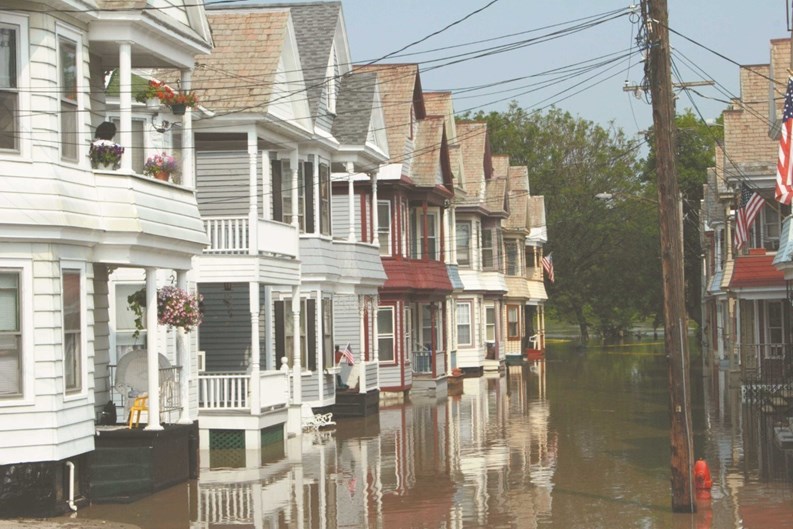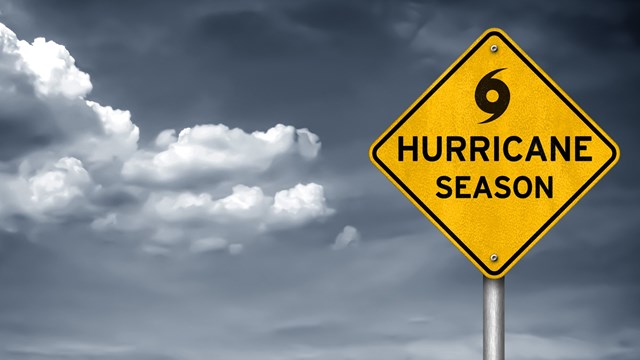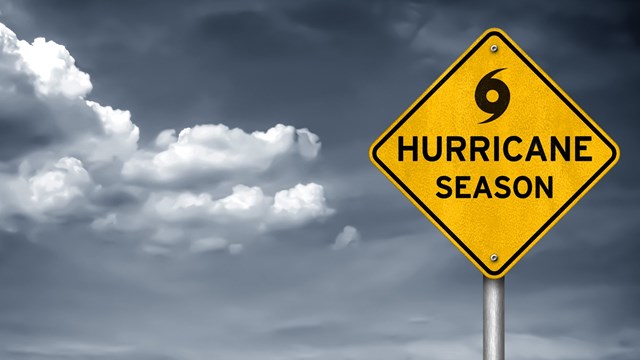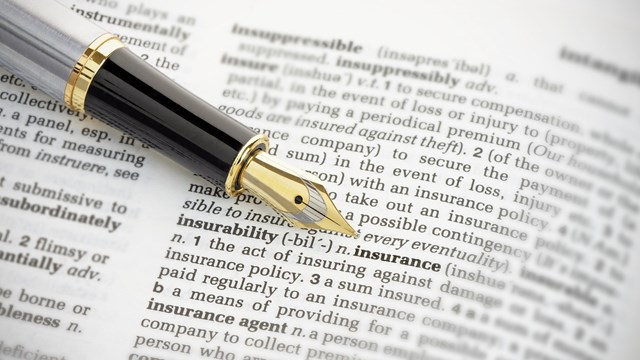The scenes are indelible: uprooted trees strewn across roadways. Windows broken. Streets flooded. Roofs torn from the homes they were designed to protect. Hurricanes are chaos machines, generating fear and destruction wherever and whenever they strike. Their after-effects can reverberate thousands of miles away and for years after they hit, especially when it comes to insurance coverage.
The after-effects of the catastrophic storms that hit Florida in 2004 as well as the unforgettable aftermath of Hurricane Katrina have been felt in the form of increased premiums and policy non-renewals for millions of New England condo owners who live all along the Atlantic seaboard. These changes have made it extraordinarily difficult to secure affordable coverage—or any coverage at all—for many New Englanders.
For most inland condo owners, a simple homeowner’s policy is enough coverage to protect their home and everything in it. In fact, traditionally, even hurricane damage would be covered under a homeowner’s policy. “Wind, fire, lightning, theft are all covered under the regular homeowner’s policy,” says Jamie Trussell of HUB International New England in Newburyport, Massachusetts. “No additional coverage is needed and there is no need to go buy a separate wind policy.”
Water Hazards
But residents living along the coastline, or near a lake or river, should also carry a separate flood policy. “You definitely want flood coverage if you are anywhere near the water,” says Amy Bach, executive director of United Policyholders, a consumer advocacy group based in San Francisco. Flood insurance is important because the wind portion of a homeowner’s policy only covers “shingles that have blown off, siding damage or damage from wind-driven rain,” Trussell says. Flooding that comes from rising waters or ocean or river surges are not covered.
While those two policies—homeowner’s and flood—have been par for the course for the last few decades, things have started to change in recent years. “We’ve seen a lot of smaller companies that are no longer giving policies out in coastal areas,” says Paula Aschettino, chairperson of the Cape Cod advocacy group Citizens for Homeowners Insurance Reform. “Private insurance companies are handling current policies but are not taking new clients—which means there is a lot less new opportunity for comparison shopping and as a result, rates have gone up.”
Other insurance companies are simply not renewing policies, while still others are now requiring wind deductibles, hurricane deductibles or even separate hurricane policies. “Some companies have carved out hurricanes as a separate risk that now requires extra rider or extra coverage,” says Bach. “In Louisiana and Texas, it’s common for people to carry three separate policies: homeowner’s, flood and wind storm.” And now some of that has come to New England condo owners.
Trussell has seen the changes, too. “I’ve seen some companies that were definitely more cautious after Katrina,” she says. “They weren’t writing coastal properties any more. Wind deductibles were implemented for the first time in those locations.”
New Computer Models
Both Bach and Aschettino believe that the changes in the insurance industry came about not as a direct result of any particular storm but more as a result of new forms of computer forecasting now used by many providers. “I think it started with the growth of the forecasting industry and the companies that sell data to insurance companies,” Bach says. “They have reduced the number of years used in their forecasting. Traditionally, it’s been done on a 100-year basis and now some forecasters have reduced it to five-year forecasts. Those results have scared insurers.”
Aschettino feels, too, that these predictions are being made “without regard to past historical events or the geographic features of the region or even the water temperatures.” In short, computer models that might make sense in Florida might not fit for Massachusetts.
“If we had a track record because of numerous claims, I could see it,” Aschettino says. “But (coastal Massachusetts) has had fewer wind claims for the last ten years than western Massachusetts.”
The new modeling systems have hit coastal New Englanders hard. Homeowners in Massachusetts that have had policies non-renewed or new residents who have not been able to get policies at all are often forced to sign on the Fair Plan, which is that state’s policy of last resort for those who cannot get coverage from other insurers. Recently, state legislation was considered that would have raised Fair Plan rates 25 percent. Although the increase was shot down, it shows the potential uncertainty that exists out there for many condo owners.
Subtle but Costly Changes
In some instances, homeowners have seen subtle changes in their policies. In Massachusetts, in some cases coastal homeowners who report wind damage “have to pay two to five percent of the policy amount out of pocket before the policy will pay off,” Aschettino says. That’s on top of the “average of $2,200 a year that coastal homeowners pay, where an off-Cape homeowner might spend $950 a year,” she adds.
What can be done to ease the pain? Although it’s true that a number of companies are making it more difficult to get insurance, there are still opportunities for comparison shopping, says Trussell. “At this point in New England, people can go to another carrier.” That’s because some places are starting to argue that the area does not get hit that hard by hurricanes. “Some insurers are staying fast with the wind deductibles and higher premiums, but you can definitely shop around.”
It also helps if condo owners and associations engage in mitigation and make improvements to the property that will ensure less damage in the event that a serious storm does hit. Cutting down dead trees, installing new wind-resistant windows, making sure fencing is secure, checking that shingles and siding are in good repair—all of these actions can help reduce premiums and make the property look more desirable to an insurance provider.
If improvements are made, homeowners should be sure to let their insurance company know right away, as most carriers only inspect the property when the policy is first enacted. Talking with the provider is also a good way to get suggestions on additional improvements that could be made. “Insurers can make loss-control recommendations when they make inspections,” Trussell says.
Ask Questions
It is important, too, to ask questions. “Homeowners should check with their providers and ask, ‘Do I have a windstorm and hurricane exclusion and if so, what can I buy that will override that?’ And while you’re on the phone with your representative, take detailed notes and then put those notes in a safe place, off-premises. What your agent or insurer says to you is very important and after the fact, you might need to refer back to it later.”
If being a good customer still results in a non-renewal or significant rate hike, the next step would be to contact the state regulatory agency that covers insurance and file a consumer complaint.
Aschettino urges condo and other homeowners to stay active and informed. “Citizens’ voices are very, very important,” she says. People can “contact their regulators and insurance commissioners and insist that hurricane data and models make sense and are comparable with the historical past, reflect building codes, topography and other scientific data. Once the data starts to get corrected, I feel that insurance companies will feel more comfortable covering coastal areas.”
Consumer voices also are important in improving the impact of mediations. “If mediations are done, there needs to be a real deduction in the premiums. Sometimes the reductions, even after mediations take place, are minute.” Aschettino’s group is also pushing legislators to require better scrutiny when rate hikes are enacted.
In an ideal world, Bach says, insurance would be streamlined. “There should be one policy on your house that covers everything,” she says. “These days, homeowner’s policies are changing with more and more exclusions being added. You know your policy covers fire, but what else? They start putting in mold exclusions or sewer back-up exclusions or terrorism exclusions.” When a policy has that many holes, genuine concern arises among homeowners.
What does the future hold for this conundrum that affects policy holders, policy makers and insurers? “There is a dynamic in play right now between regulators, industry and consumers, which I think is positive,” Bach says. “The media has been great about covering insurance issues. And more insurers are now aware of the problems.” All of which means hope for a far less stormy future for the residents of coastal New England.
Liz Lent is a freelance writer and a regular contributor to New England Condominium and other publications.







Leave a Comment